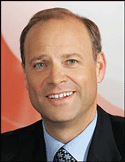 |
| Sanofi CEO Chris Viehbacher |
Four months after Sanofi wrote off its late-stage cancer drug iniparib as a total loss, the pharma giant has been forced by safety concerns to shutter its program for the JAK2 inhibitor fedratinib in another major blow to its efforts to develop a portfolio of oncology treatments.
The move came 5 days after the FDA ordered Sanofi ($SNY) to put its clinical trials of fedratinib (SAR302503) on clinical hold after myelofibrosis patients in the studies began to develop Wernicke's encephalopathy--a neurological condition spurred by biochemical brain lesions. According to ClinicalTrials.gov there were 7 ongoing clinical trials of the drug, once billed as an anchor therapy for Sanofi as it tried to build a cancer pipeline.
Now Sanofi says all the trials will be ended, along with any hopes of regulatory filings. A company spokesperson tells FierceBiotech that the FDA ordered the clinical hold on Nov. 13, after Sanofi investigators reported the cases of Wernicke's encephalopathy.
The clinical trial disaster underscores Sanofi's growing problems on the R&D side of the business. CEO Chris Viehbacher has been struggling to restructure the company's research wing, hampered by strong French unions and outspoken government officials. While Sanofi recently won approval for Genzyme's Aubagio for multiple sclerosis, a second MS treatment--Lemtrada--has caught major flack from the FDA, raising the prospect that even an approval would only open the door to relatively small sales.
On the cancer side Zaltrap was approved, but the price had to be discounted after some vocal physicians stopped using the drug after criticizing the price tag. Creating a top cancer drug division was one of Viehbacher's top priorities when he took the helm in 2008. But things haven't worked out as planned.
Sanofi has been making progress in the diabetes R&D arena, particularly with U300, a new formulation of the blockbuster Lantus. But the company recently was forced to delay filings for the GLP-1 drug Lyxumia, falling behind competitors. Sanofi now turns to its partners at Regeneron ($REGN) to provide some excitement with a high-profile PCSK9 program it's partnered on.
Last year Sanofi spent more than $6 billion on R&D, the sixth highest in the industry. But Bernstein's Tim Anderson credits Sanofi with only one potential late-stage blockbuster, U300. After insisting for 5 years that the R&D group had to be restructured and revitalized after an era of disastrously low productivity, it's unlikely Viehbacher is happy with the R&D operation he built.
The two CEOs who can be happy today run Incyte ($INCY), which sells Jakafi for myelofibrosis, and Geron ($GERN), which recently produced some promising early-stage results for its bone marrow cancer candidate, imetelstat. Perhaps not coincidentally, Incyte shares have soared 22% in the 5 days since the clinical hold was quietly imposed by the FDA, with no announcement on the news from Sanofi.
"We are deeply disappointed to have to discontinue development of fedratinib, especially given the needs of this difficult-to-treat patient population and the earlier promise shown for this therapy, but patient safety is our top priority and drove this decision," said Tal Zaks, head of development and interim head of Sanofi Oncology.
- here's the press release (PDF)
Special Report: The Biggest R&D Spenders In Biopharma - Sanofi